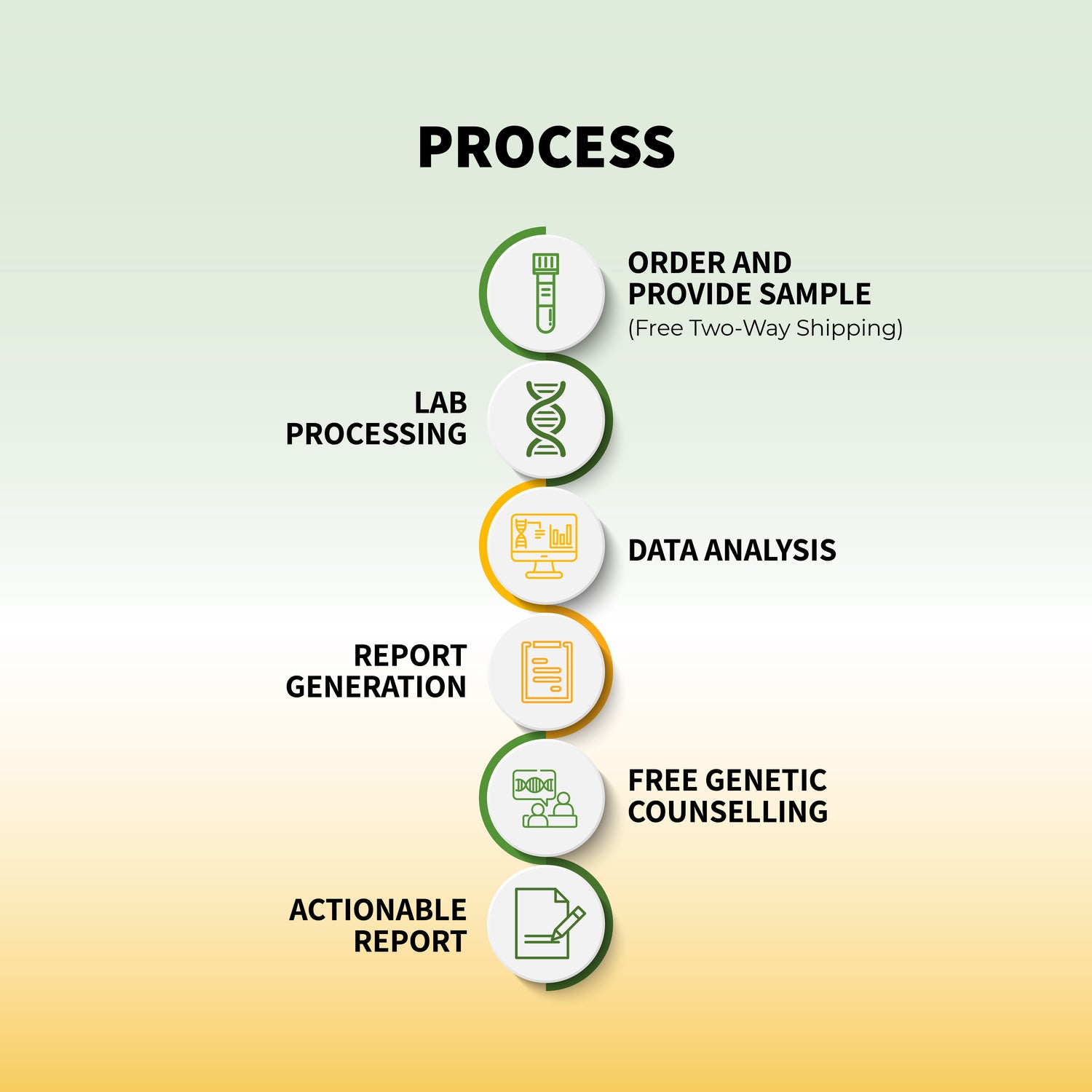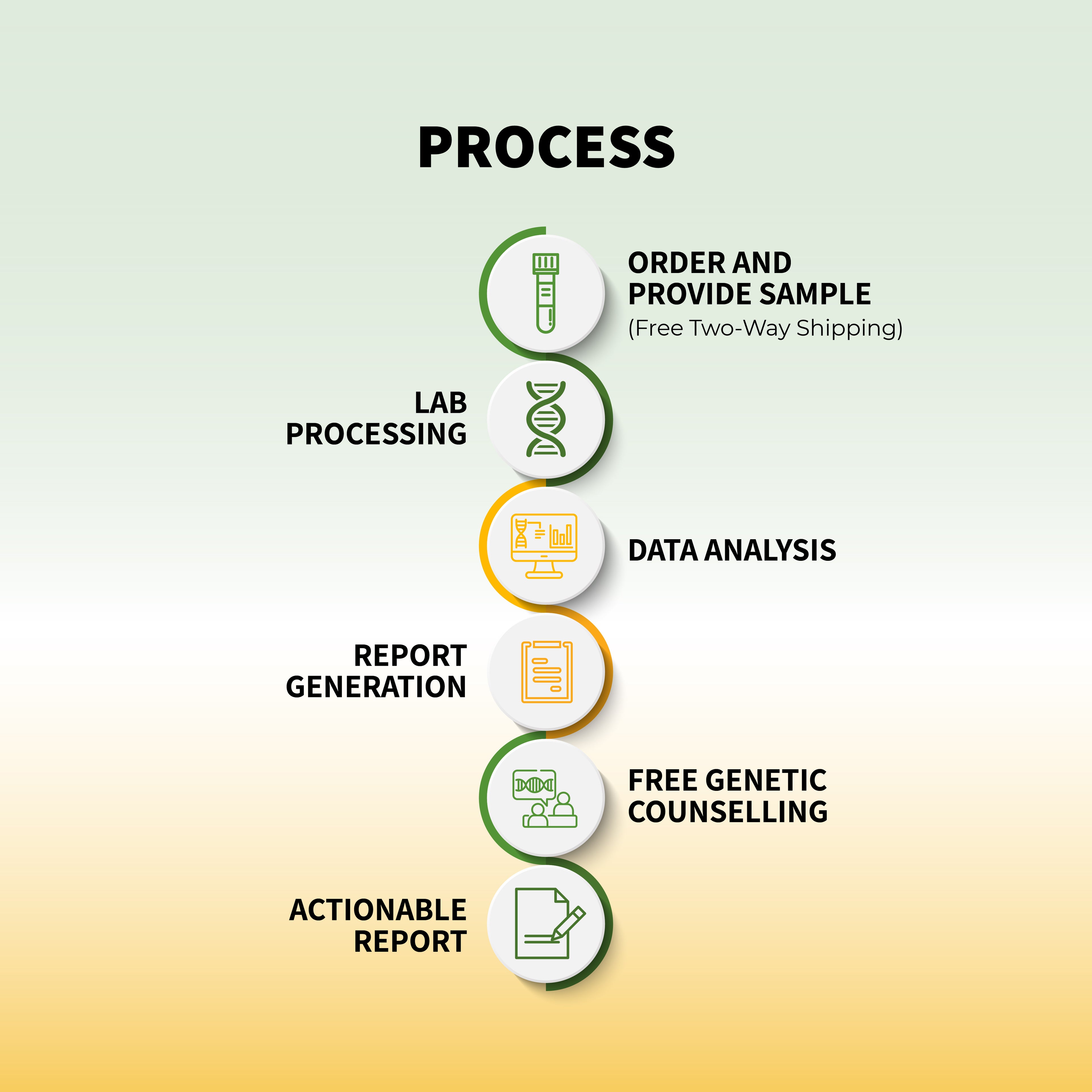एक ऐसी दुनिया की कल्पना करें जहाँ आप संभावित स्वास्थ्य जोखिमों का अनुमान लगा सकें और गंभीर समस्या बनने से पहले ही कार्रवाई कर सकें। भविष्य की बात लगती है? डीएनए परीक्षण की बदौलत, यह अब एक वास्तविकता है। अपनी आनुवंशिक प्रवृत्ति को समझकर, आप निवारक स्वास्थ्य सेवा की दिशा में सक्रिय कदम उठा सकते हैं, ऐसे विकल्प चुन सकते हैं जो आपकी अनूठी आनुवंशिक संरचना के अनुरूप हों।
इस ब्लॉग में हम यह जानेंगे कि डीएनए परीक्षण किस प्रकार रोगों की रोकथाम में सहायक हो सकता है, इसके क्या लाभ हैं, तथा यह आपको किस प्रकार स्वस्थ जीवन जीने में सक्षम बनाता है।
डीएनए परीक्षण क्या है और यह कैसे काम करता है?
डीएनए परीक्षण, जिसे आनुवंशिक परीक्षण के रूप में भी जाना जाता है, आपके डीएनए में उन विविधताओं की पहचान करने के लिए आपकी आनुवंशिक सामग्री की जांच करता है जो कुछ स्वास्थ्य स्थितियों से जुड़ी हो सकती हैं।
यह ऐसे काम करता है:
- नमूना संग्रहण : लार या रक्त का नमूना एकत्र किया जाता है।
- डीएनए विश्लेषण : नमूने को प्रयोगशाला में भेजा जाता है, जहां आनुवंशिक मार्करों के लिए उसका विश्लेषण किया जाता है।
- परिणाम व्याख्या : परिणाम प्रदान किए जाते हैं, जो विशिष्ट स्थितियों के प्रति आपकी आनुवंशिक प्रवृत्ति पर प्रकाश डालते हैं।
डीएनए परीक्षण से हृदय रोग, मधुमेह और यहां तक कि कुछ कैंसर जैसी बीमारियों के जोखिम का पता चल सकता है, जिससे शीघ्र पता लगाना और हस्तक्षेप करना संभव हो सकता है।
निवारक स्वास्थ्य सेवा के लिए डीएनए परीक्षण क्यों महत्वपूर्ण है
1. स्वास्थ्य जोखिमों का शीघ्र पता लगाना
अपनी आनुवंशिक प्रवृत्ति को जानने से आप संभावित स्वास्थ्य जोखिमों का पहले ही पता लगा सकते हैं। उदाहरण के लिए, हृदय रोग से जुड़े जीन की पहचान करने से आप लक्षण दिखने से पहले ही हृदय-स्वस्थ जीवनशैली अपना सकते हैं।
2. व्यक्तिगत स्वास्थ्य योजनाएँ
आपका डीएनए अद्वितीय है, और आपकी स्वास्थ्य ज़रूरतें भी अद्वितीय हैं। डीएनए परीक्षण आपके आनुवंशिक प्रोफ़ाइल के अनुरूप आहार, व्यायाम और चिकित्सा हस्तक्षेप पर ध्यान केंद्रित करते हुए एक व्यक्तिगत स्वास्थ्य सेवा योजना बनाने में मदद करता है।
3. सक्रिय पारिवारिक स्वास्थ्य प्रबंधन
आनुवंशिक लक्षण अक्सर परिवारों में चलते हैं। यदि डीएनए परीक्षण से किसी पूर्वाग्रह का पता चलता है, तो आपके परिवार के सदस्यों को भी अपने जोखिमों के बारे में पता होने से लाभ मिल सकता है, जिससे वे सूचित स्वास्थ्य निर्णय लेने में सक्षम हो सकते हैं।
4. दीर्घकाल में लागत बचत
निवारक स्वास्थ्य सेवा का मतलब सिर्फ़ स्वस्थ रहना नहीं है; यह किफ़ायती भी है। संभावित स्वास्थ्य समस्याओं का समय पर पता लगाने पर अक्सर गंभीर बीमारियों के इलाज की तुलना में कम खर्च आता है।
डीएनए परीक्षण से किन स्थितियों को रोकने में मदद मिल सकती है
1. हृदय संबंधी रोग
आनुवंशिक परीक्षण से हृदय रोग, उच्च रक्तचाप और उच्च कोलेस्ट्रॉल से जुड़े लक्षणों की पहचान की जा सकती है।
उदाहरण : यदि आपके डीएनए में उच्च कोलेस्ट्रॉल का खतरा दिखता है, तो आप कम वसा वाला आहार शुरू कर सकते हैं और नियमित रूप से अपने कोलेस्ट्रॉल के स्तर की निगरानी कर सकते हैं।
2.मधुमेह
कुछ आनुवंशिक लक्षण टाइप 2 मधुमेह की प्रवृत्ति का संकेत देते हैं।
उदाहरण : नियमित व्यायाम और संतुलित आहार जैसे प्रारंभिक जीवनशैली हस्तक्षेप, मधुमेह की शुरुआत को रोक सकते हैं या देरी कर सकते हैं।
3. कैंसर
BRCA1 और BRCA2 जैसे जीन स्तन और डिम्बग्रंथि के कैंसर से जुड़े हैं। डीएनए परीक्षण के माध्यम से प्रारंभिक पहचान से नियमित जांच या यहां तक कि निवारक सर्जरी जैसे निवारक उपाय किए जा सकते हैं।
4. तंत्रिका संबंधी विकार
अल्जाइमर और पार्किंसंस रोग जैसी बीमारियों को आनुवंशिक कारकों से भी जोड़ा जा सकता है। अपने जोखिम को जानने से आपको मानसिक व्यायाम और पौष्टिक आहार जैसी मस्तिष्क-स्वस्थ आदतें अपनाने में मदद मिलती है।
5. दुर्लभ आनुवंशिक विकार
डीएनए परीक्षण से दुर्लभ आनुवंशिक विकारों की पहचान की जा सकती है जो आपको या आपके बच्चों को प्रभावित कर सकते हैं, जिससे शीघ्र हस्तक्षेप संभव हो सकता है।
डीएनए परीक्षण कैसे स्वस्थ जीवनशैली को बढ़ावा देता है
1. अनुकूलित पोषण
डीएनए परीक्षण से यह पता चल सकता है कि आपका शरीर कुछ पोषक तत्वों को किस प्रकार संसाधित करता है, जिससे आपको अपना आहार निर्धारित करने में मदद मिलती है।
उदाहरण : यदि आपके जीन में लैक्टोज असहिष्णुता का संकेत मिलता है, तो आप डेयरी-मुक्त विकल्पों पर स्विच कर सकते हैं।
2. फिटनेस अनुकूलन
आपका डीएनए यह बता सकता है कि आपका शरीर व्यायाम के प्रति कैसी प्रतिक्रिया देता है।
उदाहरण : कुछ लोग आनुवंशिक रूप से धीरज वाली गतिविधियों जैसे दौड़ने के लिए बेहतर अनुकूल होते हैं, जबकि अन्य लोग शक्ति-आधारित व्यायाम में बेहतर होते हैं।
3. तनाव और नींद प्रबंधन
आनुवंशिक परीक्षण से यह पता लगाया जा सकता है कि आपका शरीर तनाव के प्रति कैसी प्रतिक्रिया करता है और किस प्रकार की नींद आपके लिए उपयुक्त है।
उदाहरण : यदि आप आनुवंशिक रूप से उच्च तनाव के शिकार हैं, तो योग या ध्यान जैसी माइंडफुलनेस प्रथाओं को अपनी दिनचर्या में शामिल किया जा सकता है।
4. बेहतर दवा विकल्प
फार्माकोजेनोमिक्स, एक प्रकार का आनुवंशिक परीक्षण है, जो यह निर्धारित करता है कि आपका शरीर दवाओं के प्रति कैसी प्रतिक्रिया करता है, जिससे यह सुनिश्चित होता है कि आपको न्यूनतम दुष्प्रभावों के साथ सबसे प्रभावी उपचार मिले।
डीएनए परीक्षण पर किसे विचार करना चाहिए?
- रोग का पारिवारिक इतिहास वाले व्यक्ति : यदि आपके परिवार में कुछ रोग रहे हैं, तो डीएनए परीक्षण आपके जोखिम का आकलन करने में मदद कर सकता है।
- परिवार नियोजन : आनुवंशिक परीक्षण से उन स्थितियों की पहचान की जा सकती है जो आपके बच्चों में आ सकती हैं।
- निवारक स्वास्थ्य देखभाल में रुचि रखने वाला कोई भी व्यक्ति : पारिवारिक इतिहास के बिना भी, डीएनए परीक्षण स्वस्थ भविष्य के लिए बहुमूल्य जानकारी प्रदान करता है।
डीएनए परीक्षण: क्या अपेक्षा करें
चरण 1: परामर्श
परीक्षण के लिए अपने लक्ष्यों पर चर्चा करने के लिए किसी स्वास्थ्य सेवा प्रदाता या आनुवंशिक परामर्शदाता से मिलें।
चरण 2: नमूना संग्रह
लार या रक्त का नमूना दीजिए, जिसका प्रयोगशाला में विश्लेषण किया जाएगा।
चरण 3: परिणाम समीक्षा
अपनी आनुवंशिक प्रवृत्ति और अगले कदमों को समझने के लिए किसी स्वास्थ्य देखभाल पेशेवर से अपने परीक्षण के परिणामों की समीक्षा करवाएं।
चरण 4: कार्रवाई करें
अपने डीएनए परीक्षण से प्राप्त जानकारी का उपयोग जीवनशैली में परिवर्तन करने, नियमित जांच कराने, या आवश्यकतानुसार चिकित्सा हस्तक्षेप पर विचार करने के लिए करें।
रोग की रोकथाम के लिए डीएनए परीक्षण के बारे में अक्सर पूछे जाने वाले प्रश्न
प्रश्न 1: क्या डीएनए परीक्षण सटीक है?
हां, प्रतिष्ठित प्रयोगशालाओं द्वारा किया गया डीएनए परीक्षण अत्यधिक सटीक होता है। हालांकि, यह गारंटी नहीं, बल्कि संभावनाएं प्रदान करता है।
प्रश्न 2: क्या मेरे डीएनए परिणाम गोपनीय रहेंगे?
प्रतिष्ठित परीक्षण कंपनियां आपकी आनुवंशिक जानकारी की सुरक्षा सुनिश्चित करने के लिए सख्त डेटा गोपनीयता कानूनों का पालन करती हैं।
प्रश्न 3: क्या डीएनए परीक्षण से सभी बीमारियों का पूर्वानुमान लगाया जा सकता है?
डीएनए परीक्षण आनुवंशिक प्रवृत्तियों की पहचान करता है, लेकिन सभी बीमारियाँ आनुवंशिकी से जुड़ी नहीं होती हैं। पर्यावरणीय कारक और जीवनशैली भी महत्वपूर्ण भूमिका निभाते हैं।
प्रश्न 4: डीएनए परीक्षण की लागत कितनी है?
परीक्षण के प्रकार और प्रदाता के आधार पर लागत अलग-अलग होती है। बुनियादी परीक्षण $100 से शुरू हो सकते हैं, जबकि अधिक व्यापक पैनल की लागत कई सौ डॉलर हो सकती है।
प्रश्न 5: क्या बच्चों का डीएनए परीक्षण किया जा सकता है?
हां, लेकिन आमतौर पर इसे विशिष्ट मामलों के लिए अनुशंसित किया जाता है, जैसे वंशानुगत स्थितियों की पहचान करना।
प्रश्न 6: क्या मुझे डीएनए परीक्षण के लिए डॉक्टर के रेफरल की आवश्यकता है?
हमेशा नहीं। कई कंपनियां सीधे उपभोक्ता के लिए परीक्षण की पेशकश करती हैं, लेकिन परिणामों की व्याख्या करने के लिए एक स्वास्थ्य देखभाल पेशेवर से परामर्श करना उचित है।
मैपमाइसीनोम कैसे मदद कर सकता है
मैपमायजीनोम में, हम आपकी स्वास्थ्य आवश्यकताओं के अनुरूप व्यापक डीएनए परीक्षण सेवाएँ प्रदान करने में विशेषज्ञ हैं। हमारे परीक्षण बुनियादी आनुवंशिक जानकारी से आगे बढ़कर निवारक स्वास्थ्य सेवा के लिए कार्रवाई योग्य सुझाव प्रदान करते हैं।
हम आपको अपने परिणामों को समझने और अपने स्वास्थ्य के लिए सही कदम उठाने में मदद करने के लिए आनुवंशिक परामर्श भी प्रदान करते हैं।
निष्कर्ष
डीएनए परीक्षण सिर्फ़ विज्ञान से कहीं ज़्यादा है - यह बेहतर स्वास्थ्य का प्रवेश द्वार है। अपनी आनुवंशिक प्रवृत्ति को समझकर, आप निवारक स्वास्थ्य सेवा के ज़रिए अपने स्वास्थ्य की देखभाल कर सकते हैं। शुरुआती पहचान से लेकर जीवनशैली में बदलाव तक, डीएनए परीक्षण के फ़ायदे बहुत ज़्यादा हैं।
क्या आप स्वस्थ भविष्य की ओर पहला कदम उठाने के लिए तैयार हैं? आज ही MapmyGenome की DNA परीक्षण सेवाओं का लाभ उठाएँ और अपने जीन की शक्ति को पहचानें!















